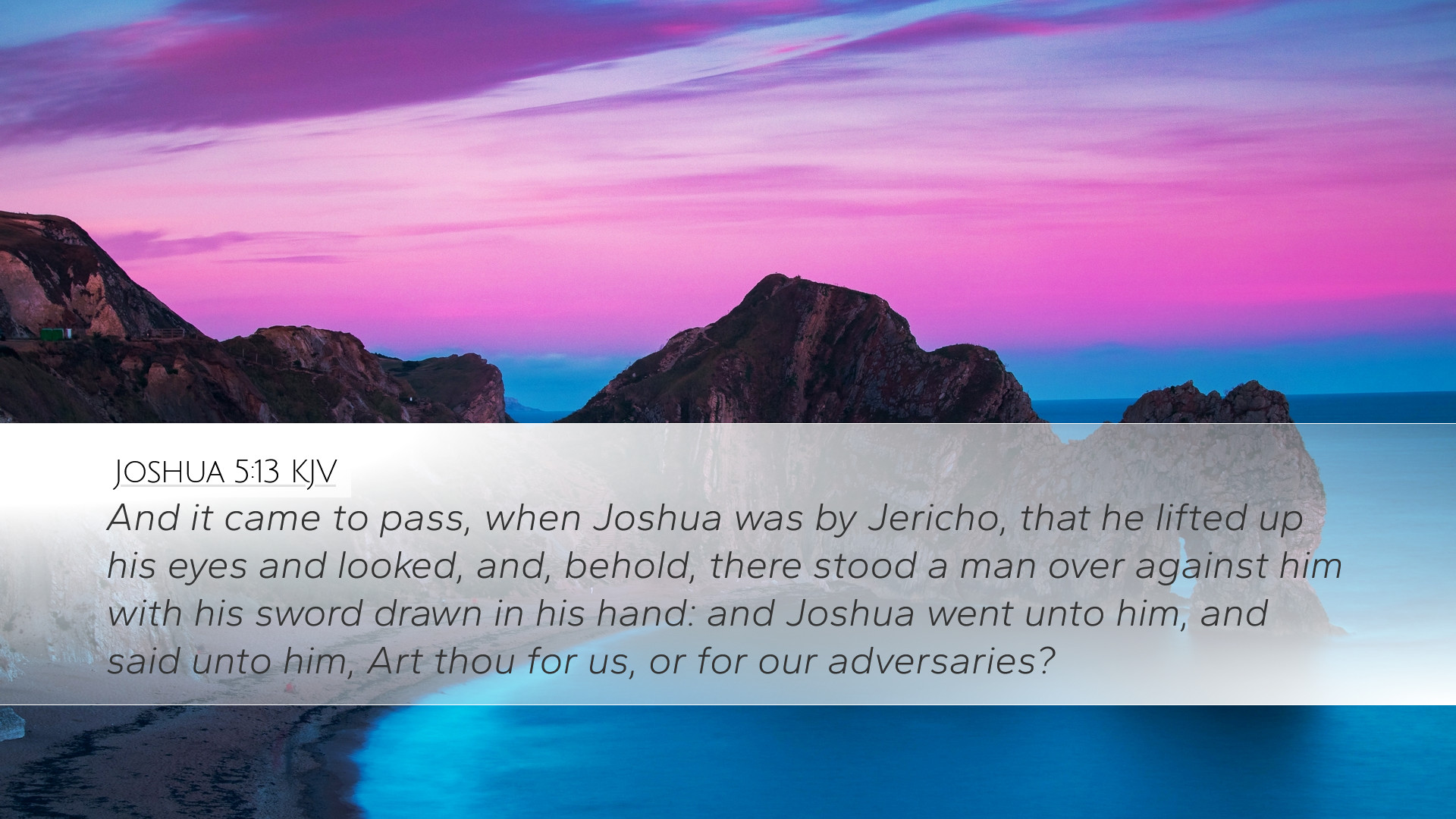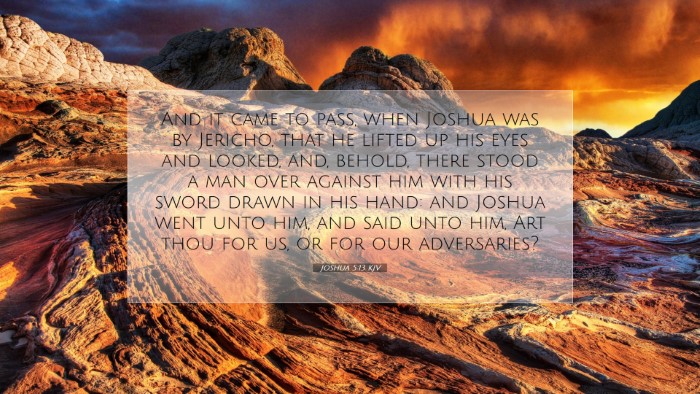Old Testament
Genesis Exodus Leviticus Numbers Deuteronomy Joshua Judges Ruth 1 Samuel 2 Samuel 1 Kings 2 Kings 1 Chronicles 2 Chronicles Ezra Nehemiah Esther Job Psalms Proverbs Ecclesiastes Song of Solomon Isaiah Jeremiah Lamentations Ezekiel Daniel Hosea Joel Amos Obadiah Jonah Micah Nahum Habakkuk Zephaniah Haggai Zechariah MalachiJoshua 5:13
Joshua 5:13 KJV
And it came to pass, when Joshua was by Jericho, that he lifted up his eyes and looked, and, behold, there stood a man over against him with his sword drawn in his hand: and Joshua went unto him, and said unto him, Art thou for us, or for our adversaries?
Joshua 5:13 Bible Commentary
Commentary on Joshua 5:13
Verse: "And it came to pass, when Joshua was by Jericho, that he lifted up his eyes and looked, and, behold, there stood a man over against him with his sword drawn in his hand: and Joshua went unto him, and said unto him, Art thou for us, or for our adversaries?"
Introduction
This verse marks a pivotal moment in the narrative of Joshua as he is preparing to lead the Israelites into battle against Jericho. It encapsulates the themes of divine encounter, leadership, and discernment which are foundational in understanding the rest of the book of Joshua. The appearance of the mysterious figure raises significant theological questions and provides a rich vein for exploration.
The Encounter with the Commander
Here, Joshua encounters a figure described as a man with a drawn sword, which indicates he is a warrior. This has been interpreted by various commentators as a manifestation of the pre-incarnate Christ or as an angelic being. Matthew Henry notes that this encounter signifies God’s immediate presence with Joshua just before the Israelites face their first major challenge in the Promised Land.
- Matthew Henry: He visually emphasizes the importance of God's leadership, suggesting that Joshua’s elevation of his eyes signifies a readiness to behold the divine amidst human conflict.
- Albert Barnes: He remarks on the dichotomy of choice that Joshua faces: to align with God's army or the adversarial forces, highlighting the importance of discernment in moments of confrontation.
- Adam Clarke: He suggests that this encounter is both an assurance and a challenge, urging Joshua to seek God's favor rather than merely relying on military strength.
The Significance of Location
Joshua's position "by Jericho" is geographically and symbolically significant. The city of Jericho represents a stronghold of opposition and a barrier to the promised inheritance. Therefore, Joshua’s posture—lifting his eyes—symbolizes an acknowledgment of greater power and authority beyond his immediate circumstances.
The Question of Allegiance
Joshua's inquiry—"Art thou for us, or for our adversaries?"—highlights a common human tendency to seek divine allegiances based on circumstances. However, the response from the figure is profound and shifts the focus from human perspectives to divine purposes.
- Matthew Henry: Notes that the divine commander does not answer Joshua’s question directly but instead emphasizes God's sovereignty and purpose over human alliances.
- Albert Barnes: Underlines the fact that God's existence transcends human conflict; He is neither for the Israelites nor for the inhabitants of Jericho in a political sense but stands for His divine will.
- Adam Clarke: Comments on the implications of divine warfare and the necessity for Joshua to realize that victory for Israel depends on obedience to God's commands, not merely on military tactics.
Reflection on Leadership
This interaction serves as a transformative moment for Joshua's leadership. It prompts a reevaluation of his approach—steering away from mere military strategy towards spiritual reliance. Joshua must recognize who he is serving and the divine mission at hand.
The Nature of Divine Communication
The appearance of a celestial being with authority poses questions about how God communicates with His leaders. Joshua's intimate dialogue with this figure reflects an important aspect of biblical leadership—the ability to discern God's voice amid noise and chaos.
- Matthew Henry: Highlights the necessity of spiritual vigilance, encouraging leaders to seek divine guidance through prayer and contemplation before engaging in spiritual battles.
- Albert Barnes: Encourages leaders to recognize that obedience to God's will is paramount; success in conquest is contingent upon wholly embracing divine direction.
- Adam Clarke: Points out that God's communication through visions and encounters invites the leader into deeper trust and reliance on God’s promises.
Implications for Modern Leadership
For pastors and spiritual leaders today, Joshua's experience serves as a model of humility, seeking divine guidance, and aligning oneself with God's mission. The emphasis on spiritual discernment encourages contemporary leaders to evaluate their motives, align with God's purposes, and approach challenges with a divine perspective rather than just human insight.
Conclusion
Joshua 5:13 calls us to examine our own allegiances and reliance on God when facing challenges. The interaction between Joshua and the commander illustrates that God's plans transcend human conflicts and highlight the importance of understanding His will. As leaders and scholars, the insights gleaned from this verse compel us to pursue humility, divine favor, and clarity in our mission.


